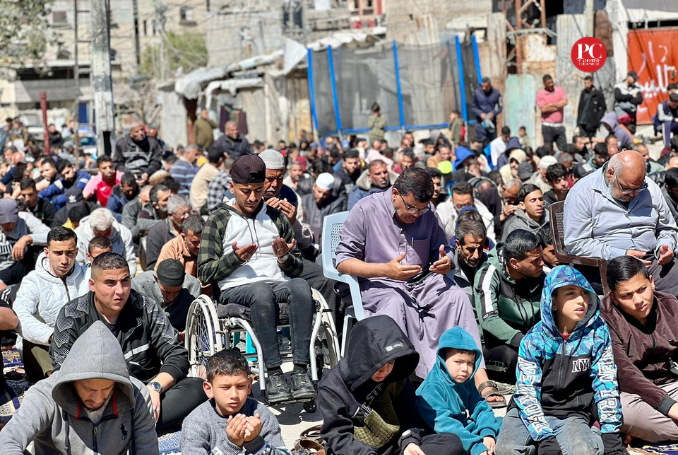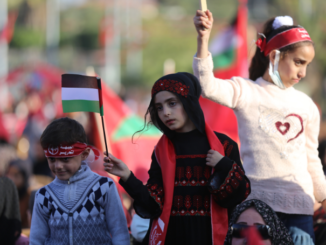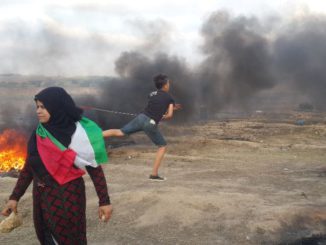
By Benay Blend
This year Land Day occurs during genocide, Israel’s destruction not only of people’s lives but also of the land. By March 30, 2024, Gaza will have undergone nearly six months of brutal genocide inflicted by the Zionist regime.
In March 1972, Ghassan Kanafani attended the fifth conference of the Popular Front for the Liberation of Palestine (PFLP) in northern Lebanon. Out of that meeting came Kanafani’s document “Tasks for a New Age,” a text that could have easily been written for Land Day 2024.
“The resistance experience in Gaza,” Kanafani wrote, “constitutes one of the most prominent historical experiences concerning the capacity of a small, poor, unarmed and geographically isolated people to continue, given its conditions a heroic and almost unknown struggle.”
On March 30, 1976, Israeli police murdered six Palestinian civilians while they were protesting further expropriation of Palestinian land. Since that date, March 30 has been commemorated as Land Day, in honor of Indigenous sumoud (resilience).
This year Land Day occurs during genocide, Israel’s destruction not only of people’s lives but also of the land. By March 30, 2024, Gaza will have undergone nearly six months of brutal genocide inflicted by the Zionist regime. As of March 21, there were 31,988 dead, 74,188 wounded, 7,000 missing, along with countless homes, institutions, hospitals, and infrastructure destroyed.
Nevertheless, the struggle continues just as Kanafani said, with the caveat that although Gaza might be isolated geographically as well as by the Zionist’s blockade, it is no longer insular in spirit as the entity’s campaign of ethnic cleansing has united the various factions throughout historic Palestine as well as around the world.
As Dr. Amira Abo el-Fetouh explains, this year’s Land Day will feel different. “In every practical sense of the word,” she writes, “Gaza is uninhabitable” due to the Zionist siege. Yet many refuse to leave.
Accordingly, Louis Brehony describes what he calls “the price of sumud,” specifically, his wife’s family in Gaza City who refuse to leave their home, though so far it has been demolished twice by the entity’s bombs. Fortunately, the family has survived, but their story is one of many whose homes have been destroyed, sometimes along with the inhabitants.
“How many others have been martyred,” declares Abulayth, “we do not know.” It is this very horror, the stories that multiply day by day, that makes this Land Day so unbearable but at the same time so significant.
How do people whose homes have been destroyed along with the ground they stood on celebrate a day that commemorates the land? In Albuquerque, New Mexico, where I live, I recently witnessed a procession of shopping carts going slowly down the street, their owners fortunate to have a cart in which to store their belongings.
In recent years, the term “houseless” has replaced the former label “homeless,” partly because it recognizes that nearly everyone has a home composed of friends, family, and community. For many Palestinians, the land is more precious than a home.
According to el-Fetouh, this connection to the land represents “Palestinian patriotism and embod[ies] the struggle to restore harmony and national unity among all Palestinian factions.” This year the notion of unity is particularly important, pertaining not only to unity among the factions but also with the diaspora as well as solidarity movements around the world.
On March 15, 2024, Palestinians in Palestine and in exile drafted a statement calling for “unity of land, people, and struggle.” Published in Mada Masr, it declares that liberation is near, making collective struggle more pertinent now than ever. In Gaza, it explains, the people are “showing us the way, reclaiming our agency and advancing the struggle for a better life, not only in Palestine but beyond it as well.”
The statement acknowledges the role of Palestinians in exile, detainees in the prisons, farmers among the olive groves in occupied Palestine, and those participating in solidarity movements joined by international allies from South Africa to the streets of major cities in the West. Rather than dwelling on defeat, it documents major victories that have shown the world that the entity is not invincible.
Significantly, the document states what must happen beyond a ceasefire to prevent returning to the status quo. “There will never be Palestinian sovereignty without dismantling Zionism,” it declares, just as there can be no solution that does not include the legitimate right of return.
It concludes with the mantra that is often heard at rallies: there can be “no peace without justice,” a demand that is not met by the calling only for a “ceasefire,” as was seen in the latest “false ceasefire call” that was made by the U.S. at the U.N.
Calling to mind Kanafani’s internationalist agenda, the statement praises global allies, particularly South Africa, for fighting alongside Palestinians for a more just global order. When he said the following, Kanafani could have had in mind present-day supporters who hail from the global south: “Imperialism has laid its body over the world, the head in Eastern Asia, the heart in the Middle East, its arteries reaching Africa and Latin America. Wherever you strike it, you damage it, and you serve the world revolution.”
Accordingly, this year’s African Liberation Day (ALD), held traditionally on April 15, considers Palestine, the Americas, Africa, and Oceania as the same struggle, a collective fight to “smash settler-colonialism.” Similarly, NDN Collective links the right of return with land back, once more quoting Kanafani as justification: “The Palestinian cause is not a cause for Palestinians only, but a cause for every revolutionary, as a cause of the exploited and oppressed masses in our era.”
In their position paper on this issue, NDN Collective sites settler colonialism, genocide, and apartheid as the root problems linking all Indigenous people. Just as Native people of Turtle Island fight to reclaim their land, so Palestinians struggle “to return to the land and for the land to return for the people.” Connection to the land defines the people’s culture as well as their role in the world.
These distinctions are important because too often western leaders and their allies divert the conversation to Netanyahu and/or the lack of a Palestinian state as the central issue. As journalist/activist Ramzy Baroud observes, the core of the problem can be deduced to the belief system that makes up Zionism, a “racist, exclusivist” ideology that relies on ethnic cleansing of Palestinians to reach its end.
For this reason, the call for a Palestinian state rings hollow. “Reducing all of these issues to that of finding creative political solutions that would merely sell false hopes to the Palestinian people is not only ignorant, or devious,” Baroud concludes, “but also a diversion from the real problem: Israel’s ideology of Zionism.”
Accordingly, on Land Day 2024 and beyond, the call for a ceasefire must be linked with a thought for what comes after, specifically the dismantling of the Zionist government to be followed by whatever the Palestinians decide.
In “Ceasefire Resolutions are Building Political Power Throughout the U.S.,” Michael Arria writes about the ways that the spread of city resolutions are “turn[ing] street power into political power.” While people are beginning to make connections between Israel and U.S. militarism, Arria concedes that these resolutions are merely symbolic in terms of ending the genocide in Gaza.
To place Palestinians at the center, these calls must go further by including demands for dismantling the Zionist state, granting the right of return, and, finally, a call for those responsible for the genocide, as well as those who aided and abetted, to be brought before the International Criminal Court (ICC) as war criminals.
On Land Day in 2021, Yousef M. Aljamal prophetically wrote the following: “It is the land that has always connected Palestinians with the notion of home – not walls, not houses, not debris or bricks. For this reason, demolishing Palestinian houses may make Palestinians houseless, but they will never be homeless or landless. Because our home is our land.”

– Benay Blend earned her doctorate in American Studies from the University of New Mexico. Her scholarly works include Douglas Vakoch and Sam Mickey, Eds. (2017), “’Neither Homeland Nor Exile are Words’: ‘Situated Knowledge’ in the Works of Palestinian and Native American Writers”. She contributed this article to The Palestine Chronicle.








Be the first to comment